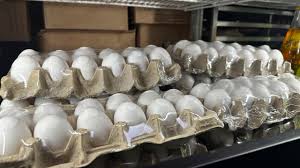Kansas City, KS — Shoppers across Kansas are feeling the squeeze as egg prices continue to rise, impacting household budgets and reshaping grocery shopping habits. A combination of supply chain issues, inflation, and ongoing effects of avian flu outbreaks have led to a steady increase in the cost of this staple food item.
For families, small businesses, and local food establishments, the climb in egg prices comes as another hurdle in an already challenging economic climate. According to recent data from the U.S. Department of Agriculture (USDA), the average cost of a dozen eggs in the Midwest surged by nearly 20% compared to the previous month.
What’s Driving the Surge in Egg Prices?
The rise in egg prices can be attributed to several interrelated factors. First and foremost, outbreaks of highly pathogenic avian influenza (HPAI) have taken a toll on poultry farms across the U.S., including Kansas. Since early 2022, millions of egg-laying hens have been culled to contain the spread of the virus, drastically reducing the supply of eggs.
Additionally, the Kansas Department of Agriculture highlights the ripple effects of rising feed costs and transportation expenses. The ongoing inflationary pressures have also pushed production costs higher, leaving farmers with no choice but to pass on some of the burden to consumers.
“These price increases are not just about eggs but about the entire supply chain,” said Alan Stewart, a poultry farmer in central Kansas. “The cost of grain has skyrocketed, and fuel prices make transporting eggs more expensive than ever before.”
The Impact on Kansas Consumers
The rising cost of eggs is being felt most acutely by households with limited budgets. Eggs, often considered an affordable source of protein, have traditionally been a staple food for low- and middle-income families. Now, some shoppers are making tough decisions at the grocery store.
“Every time I walk into the grocery store, I feel like I’m paying more for less,” said Rachel Morgan, a mother of three in Wichita. “Eggs used to be my go-to for quick meals or baking, but now I’m rethinking how much we use them.”
Small businesses, particularly bakeries and restaurants, are also grappling with the rising costs. Many are forced to increase menu prices, reduce portion sizes, or find alternative ingredients to stay profitable.
“We’ve had to raise prices on our pastries by about 10%,” said Linda Park, the owner of a local bakery in Topeka. “It’s tough because we don’t want to lose customers, but at the same time, we can’t afford not to.”
Government Response and Support for Farmers
To address the situation, state and federal authorities are working on strategies to stabilize egg prices and support farmers. The USDA’s Agricultural Marketing Service is actively monitoring egg production and pricing trends, while offering financial assistance to affected farmers.
In Kansas, local government programs are being implemented to help poultry farmers rebuild their flocks and adopt biosecurity measures to prevent future outbreaks of avian flu. For example, the Kansas Poultry Improvement Plan provides guidance and resources to help farmers maintain healthy flocks and manage disease outbreaks effectively.
Consumers, too, are being encouraged to explore cost-saving measures, such as buying eggs in bulk or opting for generic brands. The Kansas State University Extension Office has also published resources on budget-friendly meal planning and alternative protein options.
Alternatives to Traditional Eggs
As prices soar, some Kansas shoppers are turning to alternatives like plant-based egg substitutes, which are increasingly available in grocery stores. While these substitutes are not yet mainstream, they offer an option for those looking to cut costs or reduce reliance on animal products.
Others are exploring local farmers’ markets, where eggs can sometimes be found at lower prices than in big-box stores. Supporting local producers not only helps the community but can also provide fresher, higher-quality eggs.
Looking Ahead
Experts predict that egg prices may remain elevated for the foreseeable future, though some relief could be on the horizon if avian flu outbreaks subside and supply chains stabilize. However, much depends on global economic conditions, feed costs, and the ability of farmers to recover from current challenges.
In the meantime, Kansas residents are finding creative ways to adapt. Whether through cutting back on egg consumption, seeking alternatives, or supporting local farmers, the community is showing resilience in the face of adversity.
As Rachel Morgan puts it, “We’ll manage somehow, but I hope things get better soon. Eggs shouldn’t feel like a luxury.”
For more information on food prices and agricultural trends, visit the USDA’s Economic Research Service or the Kansas Department of Agriculture’s Consumer Resources.
Disclaimer – Our team has carefully fact-checked this article to make sure it’s accurate and free from any misinformation. We’re dedicated to keeping our content honest and reliable for our readers.








